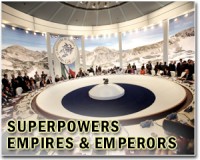 |
New Delhi (AFP) May 21, 2011 The newly-elected head of Tibet's government-in-exile has warned India that it is being encircled by "Chinese interests" as Beijing strengthens its South Asian presence. China has been boosting its regional influence by developing relations with Pakistan, Sri Lanka, Bangladesh and Nepal, said Lobsang Sangay, elected by Tibetan exiles as their new premier after the Dalai Lama announced he would retire as the Tibetan movement's political leader. "You can see the encirclement of India by China interests," the 43-year-old international law expert said in his first wide-ranging interview with Indian television since his election last month. "I just want to remind or highlight these facts," the Harvard academic told India's NDTV channel. "Let Indian leaders decide for themselves what to do." India is home to at least 100,000 Tibetan exiles, many of whom live in the northern hill town of Dharamshala, where the Dalai Lama and Tibet's government-in-exile are based. Sangay's comments chime with New Delhi's own worries that deep-pocketed China is seeking to encircle the Indian Ocean region with huge infrastructure development projects from arch-rival Pakistan to Myanmar. Indo-Chinese relations also have become more tense in recent years over such issues as their disputed Himalayan border, the trigger for a brief, bloody war in 1962, despite flourishing trade between the two fast-growing economies. Sangay appealed to the New Delhi government to consider Tibet's future "as a core issue between India and China and accordingly please act on it." But New Delhi has long trod a cautious policy on Tibet for fear of riling Beijing, stipulating that Tibetans can remain in India as long as they do not use the country as a springboard for anti-Chinese activities. Sangay is a far more prominent and influential figure than any of his predecessors after the Dalai Lama's decision to transfer his political powers to the head of the government-in-exile. He hit out at Chinese government officials who he said have refused to accept his election as the new Tibetan political head, saying doing so was "not helpful in creating a conducive atmosphere for peaceful dialogue". At the same time, he reiterated a pledge that he would abide by the Dalai Lama's "middle way" for Tibet, which calls for "genuine autonomy within China" rather than independence sought by younger, hardline Tibetan exiles. "I, as the elected head of the administration, must fulfil that policy," Sangay said, adding: "I do believe in a peaceful solution." The Dalai Lama, 75, retains the more significant role of Tibetans' spiritual leader as well as his grip on major policy-making decisions. China has for years insisted that the Buddhist monk, who fled Chinese rule of his homeland for India in 1959, wants to establish an independent Tibet -- charges the Nobel laureate has long denied.
Share This Article With Planet Earth
Related Links Learn about the Superpowers of the 21st Century at SpaceWar.com Learn about nuclear weapons doctrine and defense at SpaceWar.com
 Arab revolts, nuclear aftermath to dominate G8 summit
Arab revolts, nuclear aftermath to dominate G8 summitParis (AFP) May 20, 2011 World leaders are to meet on the beaches of Normandy next week for a G8 summit dominated by the popular revolts sweeping the Arab world and the aftermath of nuclear catastrophe in Japan. After the last G8 in Canada, France predicted the Internet revolution would dominate the May 26 to 27 Deauville summit, but real revolutions in the Middle East and Japan's Fukushima disaster have forced thei ... read more |
|
| The content herein, unless otherwise known to be public domain, are Copyright 1995-2010 - SpaceDaily. AFP and UPI Wire Stories are copyright Agence France-Presse and United Press International. ESA Portal Reports are copyright European Space Agency. All NASA sourced material is public domain. Additional copyrights may apply in whole or part to other bona fide parties. Advertising does not imply endorsement,agreement or approval of any opinions, statements or information provided by SpaceDaily on any Web page published or hosted by SpaceDaily. Privacy Statement |